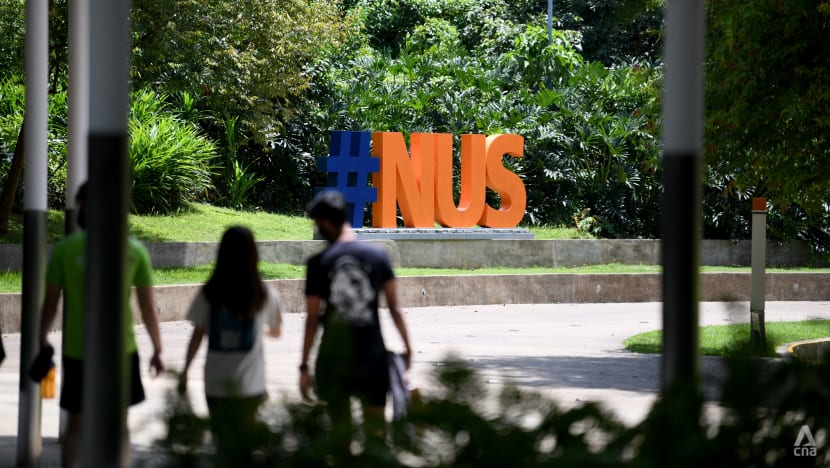2 men jailed for conspiring with NUS lab executive to cheat more than S$350,000

File photo of signage as seen at the National University of Singapore. (Photo: CNA/Calvin Oh)
SINGAPORE: Two men were on Friday (Jul 1) sentenced to jail for cheating the National University of Singapore (NUS) into awarding more than S$350,000 worth of supply orders to their companies.
Gan Yee Aun, 35, and Sandy Tan Wei Jie, 34, each received 16 months and two weeks' jail for their role in a scheme initiated by then NUS employee Liaw Jinle.
Liaw, 34, joined NUS' Centre for Advanced 2D Materials as a laboratory executive in 2016. He was earlier sentenced to 20 months and two weeks' jail for his role in the scheme.
As a laboratory executive, Liaw was tasked with sourcing quotations for the centre's procurement needs.
In 2017, Liaw approached Gan, whom he met in reservist training, with his idea of setting up a company and directing jobs from NUS there to earn profit. He knew that he could not register this firm himself due to conflict of interest.
Gan agreed to the scheme, and in late 2017 set up two companies to secure jobs from NUS with Liaw's assistance. Over the next two years, he added two more firms to the arrangement.
From November 2017 to February 2020, Gan cheated NUS of more than S$196,000 through 72 jobs awarded to his companies.
He got information from Liaw on how to price quotations to ensure maximum profits, and took advice on how to fill in quotations and invoices to NUS so that they appeared more professional.
The jobs generally had a profit margin of 10 to 30 per cent. Initially, the agreement was for Gan to get two-thirds of the profits.
But in January 2019, both men agreed for Liaw's one-third share of the profits to go towards paying off the interest on his debts to Gan.
Liaw had been borrowing money from Gan and licensed moneylenders since 2016, for purposes such as paying off his credit card bills and financing his wedding and renovation works.
Tan and Liaw also embarked on a similar scheme. Tan admitted to deceiving NUS into paying more than S$162,000 to two companies that he owned between March and December 2019.
Gan, who was represented by Mr Cory Wong, estimated his profit to be at least S$41,000. He voluntarily surrendered this amount a day before the hearing.
He pleaded guilty to one count of cheating and two counts of corruption, with four more similar charges considered for sentencing.
Tan estimated his gains to be around S$81,000, of which he has voluntarily surrendered about S$20,000. He was represented by Mr Ang Sin Teck.
He pleaded guilty to two counts of cheating and corruption, with another two similar charges considered for sentencing.
Deputy Public Prosecutor Victoria Ting told the court that as Liaw initiated the scheme, Gan and Tan's sentences should be adjusted with reference to his jail term.
The prosecutor also acknowledged the full repayment and partial repayment made by Gan and Tan respectively of their profits from the scheme.
But she added that in Gan's case, he was the main beneficiary of the profits from the arrangement with Liaw, and actively broadened the reach of the scheme to more companies.
She sought the sentence imposed on Gan, and asked for at least 16 months for Tan in the interests of parity.
Mr Wong sought no more than nine months and two weeks' jail for his client, and argued that Gan had repaired NUS' outstanding economic loss by paying back his full profits to the university.
But District Judge Ronald Gwee said that some losses were immeasurable, such as the loss of confidence in "a system where integrity plays a primary position".
He said that the prosecution's sentencing position was a reasonable compromise between Gan, Tan and Liaw's comparative levels of culpability.
The punishment for cheating is up to 10 years' jail with the possibility of a fine.
The penalty for a corrupt transaction with an agent is up to five years' jail, a fine of up to S$100,000 or both.














